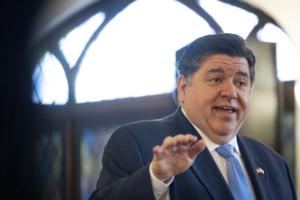Current News
/ArcaMax
California's Riverside County deputy, 14 others arrested in drug trafficking bust
LOS ANGELES — Culminating a yearlong investigation dubbed "Hotline Bling," authorities in Riverside County have seized millions of dollars worth of illegal drugs and arrested 15 people suspected of helping a Sinaloa, Mexico, cartel's drug trafficking network, including a Riverside County Sheriff's deputy.
In collaboration with the Riverside ...Read more
Analysis: What to watch during what could be Biden's final White House correspondents' dinner
WASHINGTON — Joe Biden’s aviator sunglasses likely won’t be far away Saturday night when the president cracks some jokes at the annual White House Correspondents’ Association dinner. But not everyone will be laughing during Washington’s yearly spectacle — even if “Dark Brandon” makes another appearance.
That’s Biden’s ...Read more
California's Riverside County deputy, 14 others arrested in drug trafficking bust
LOS ANGELES — Culminating a yearlong investigation dubbed "Hotline Bling," authorities in Riverside County have seized millions of dollars worth of illegal drugs and arrested 15 people suspected of helping a Sinaloa, Mexico, cartel's drug trafficking network, including a Riverside County Sheriff's deputy.
In collaboration with the Riverside ...Read more
Ukraine detains First Minister in Zelenskyy's graft crackdown
Ukraine’s agriculture minister became the first cabinet member under Volodymyr Zelenskyy’s presidency to be detained in a crackdown on corruption demanded by allies as a condition for aid in Kyiv’s war against Russia.
The High Anti-Corruption Court in Kyiv ordered Mykola Solskyi, who has overseen Ukraine’s grain-export policy during the...Read more
Xi warns Blinken against 'vicious competition' between US, China
President Xi Jinping warned America’s top diplomat that the U.S. shouldn’t target or oppose China, as the world’s largest economies wrapped two days of talks spanning thorny disputes on trade and Beijing’s support for Russia’s war machine.
The Chinese leader met with U.S. Secretary of State Antony Blinken in Beijing on Friday ...Read more

Philadelphia has a lot more deadly shootings than expected for a big city − and NYC is much safer, new study says
Recent high-profile mass shootings at SEPTA bus stations have left Philadelphia commuters on high alert. Two gunmen opened fire at a bus stop in the Ogontz neighborhood on March 4, 2024, striking five people and killing 17-year-old Dayemen Taylor. Two days later, a group of teenagers shot eight other teens waiting at a bus stop near Northeast...Read more

Trump trial reveals details about how the former president thinks about, and exploits, the media
The first week of testimony is winding down in former President Donald Trump’s trial in New York City on charges that he falsified business records to cover up hush money payments to an adult film star, in an effort to avoid reporting the payments as campaign-related spending.
In a discussion that quickly shifted to topics well ...Read more

'Rivers in the sky' have drenched California, yet even more extreme rains are possible
LOS ANGELES — For years, scientists have said that atmospheric rivers can either make or break the water supplies of thirsty California cities and farms.
For the last two winters, a steady succession of these giant “rivers in the sky” have dumped record-breaking and drought-busting precipitation across the state, while simultaneously ...Read more

Doctors race against Florida's six-week abortion ban
ORLANDO, Fla. — With just days until Florida’s six-week abortion ban takes effect on Wednesday, providers are rushing to perform as many abortions as possible while planning contingencies for a future where they will need to turn thousands of women away.
Clinics have expanded hours, prioritized ultrasounds and added appointments in these ...Read more

Grand jury testimony, exhibits key to failed Flint water prosecution kept under seal
LANSING, Mich. — A red and white banker’s box held together with clear tape and bearing torn mailing labels was slipped last month into a closet at the Michigan Hall of Justice.
Its contents — one of the most significant, failed cases in state history — are barred by law from ever being made public. The cardboard box collecting dust in ...Read more

Emerson College protest arrests divides along public safety vs political lines
The arrest of 108 at Emerson College in the pre-dawn hours had politicians taking shots at the police who warned the students pitching tents in a public way gave them no choice.
Social media video of the police sweep shows protesters being forcibly removed from the Boylston Place location around 2 a.m. Thursday, with some refusing to move in a ...Read more

Kim Jong Un tests new rockets to strike Seoul and perhaps sell to Putin
Leader Kim Jong Un oversaw tests of a new North Korean rocket system that could bolster his ability to attack Seoul and it may become a weapon he attempts to sell to Russia for use in its assault on Ukraine.
Kim watched the test-fire of a 240 millimeter multiple rocket launcher with shells coming from a newly established arms producer that “...Read more

Senate candidate Steve Garvey: College campus protests over Gaza could trigger less federal aid to schools
Republican Senate candidate Steve Garvey strongly condemned campus protests critical of Israel’s war in Gaza and warned he’d push to take away federal aid to schools that appear to encourage dissent that’s antisemitic.
He told a Los Angeles news conference that “demonstrations that allow people to build encampments that obstruct the ...Read more

High-capacity gun magazines stay illegal in Washington state, court commissioner rules
SEATTLE — High-capacity magazines, those holding more than 10 bullets, will remain illegal to buy or sell in Washington, while the state appeals a lower-court ruling that found the ban unconstitutional, the state Supreme Court commissioner ruled Thursday.
Commissioner Michael Johnston, who acts as a gatekeeper before the court can fully ...Read more

At UC Irvine, hundreds turn out to demonstrate in support of Palestine
IRVINE, Calif. — During the two hours protesters at the University of California, Irvine chanted and marched on campus calling for the university to divest financial ties from Israel on Thursday, there was zero visible presence of officers in uniform.
That’s a far cry from the mass pro-Palestinian protest at the University of Southern ...Read more

Pecker at hush money trial says Trump feared trysts would hurt image, but didn't mention Melania
Donald Trump never mentioned worrying about his wife getting wind of his alleged trysts with porn star Stormy Daniels and Playboy model Karen McDougal — only his future in politics, a Manhattan jury heard Thursday during explosive testimony at the former president’s hush money trial.
During his third day on the witness stand, the former CEO...Read more

Illinois Gov. J.B. Pritzker pushes increased funding to fight racial disparities in homelessness
Gov. J.B. Pritzker used the release of a report on Black homelessness in Illinois to press the case for his proposal to increase funding on efforts to address the issue in next year’s budget by $50 million, which would go toward additional rental assistance, legal aid and new programs.
The report, a collaboration between the state’s Office ...Read more

US, allies press Hamas for 'immediate release' of hostages
The U.S. and 17 other nations pressed Hamas to release their citizens who are missing or held hostage in the Gaza Strip, in a bid to revive cease-fire talks that have stalled out in recent weeks and unlock more humanitarian aid.
The countries’ leaders released a joint statement Thursday intended to reflect mounting concern about the well-...Read more

As UN appeals for aid for Haiti, Pentagon sends in another military flight with supplies
Short on funding and with barely enough hot meals to last for the next six weeks, the World Food Program is appealing for humanitarian assistance for Haiti.
The organization’s deputy executive director, fresh off a visit to the Caribbean nation over the weekend, said with more than 1 million Haitians facing famine, the United Nations food aid...Read more

City College of New York becomes latest site of heated pro-Palestinian demonstrations
NEW YORK — Students set up a pro-Palestinian encampment Thursday at City College of New York, with one passerby being driven away when a protester claimed she could “smell” he was a “Zionist.”
Concern about antisemitism at protests sweeping campuses around the nation has grown in recent days, sparking demands for university officials ...Read more
Popular Stories
- Israel-Hamas war protesters clash with officers at Emory in Atlanta
- 'Bizarre': Why did Rand Paul miss the Ukraine foreign aid vote?
- Supreme Court sounds conflicted over Trump criminal immunity
- USC cancels 'main stage' commencement
- Haiti enters new era of governing: Presidential council sworn in, prime minister resigns





